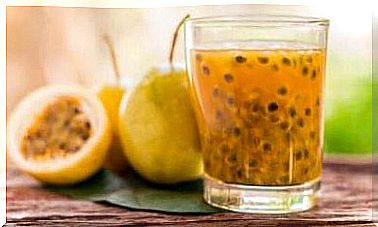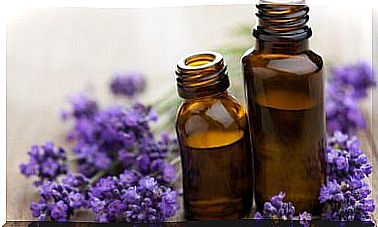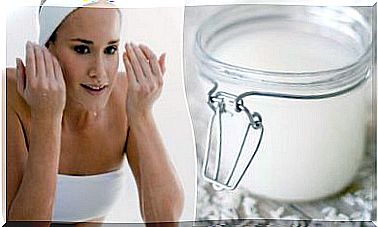Benefits Of Thyme Infusion
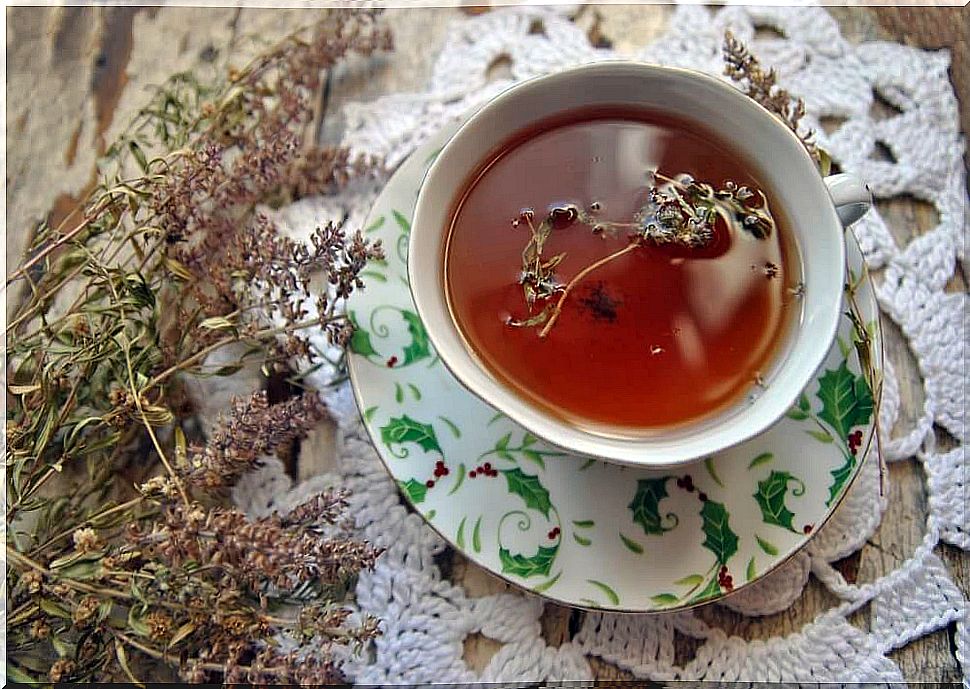
Thyme infusion is a traditional remedy that has been used since ancient times as a supplement to promote well-being. Although it is not a curative or miraculous product, its consumption is recommended as an adjunct to improve the symptoms of some diseases.
Of course, like other herbal remedies, it should be used with caution, only in specific cases. Although some studies have commented on its properties, there is still no solid evidence to consider it a first-line treatment. Learn more about this subject in this space.
What is thyme infusion for?
From now on, you will definitely not only use this herb to add flavor and aroma to your meals, but also give it the opportunity as a hot drink. Thanks to its content of thymol and other bioactive compounds, thyme has interesting health benefits.
In fact, according to information published in Phytotherapy Research , this plant has a wide range of functional possibilities in the pharmaceutical, food and cosmetic industries. In general, it exhibited antimicrobial, antioxidant, anti-inflammatory and antispasmodic properties.
1. Has antimicrobial activity
According to a research published in the International Journal of Molecular Sciences , thyme has efficient antimicrobial activities, thanks to its main active compound, thymol, which has shown effects against Gram-positive and Gram-negative bacteria
- If you have thrush or mouth sores, you can drink warm or cold thyme tea to deflate and disinfect the area.
- In addition to being a mild antiseptic, this infusion can be used to heal superficial wounds or cuts if other disinfectant products are not available.

2. Helps respiratory health
Another active compound in thyme is carvacrol. This substance has been shown to have anti-inflammatory effects. Also, as highlighted by research published in the Avicenna Journal of Phytomedicine , this substance helps reduce airway inflammation in conditions such as asthma.
It is even used as an adjunct in case of colds, bronchitis, laryngitis, among others.
- You can consume a cup of thyme infusion a day when you notice the first symptoms of illnesses such as the flu and cold. If the doctor agrees, you can also take it in case of bronchitis and asthma.
3. Prevents premature aging
Thanks to the amount of antioxidants that thyme infusion provides and its flavonoid content, you can mitigate the negative effects of free radicals and prevent premature aging of cells and organs.
According to research published in the Journal of Cellular and Molecular Medicine , the antioxidant properties of this plant, especially rosmarinic acid, act in a beneficial way against the effects of overexposure to solar UV radiation. Specifically, they can help prevent photoaging and collagen deterioration.
4. Reduces premenstrual tension
As we’ve already mentioned, there is evidence of thyme’s antispasmodic properties. Therefore, the typical symptoms of the days before menstruation can be reduced by drinking thyme tea. During the menstrual period, it can also be used to relieve cramps and other discomfort.

5. Helps regulate blood pressure
High blood pressure problems should be treated by a professional. The doctor, based on the diagnosis, will determine if some medications are necessary or if it is enough to make adjustments in the diet. However, thyme, because of its properties, seems to be a adjuvant against hypertension.
According to data from a study published in Acta Poloniae Pharmaceutica , extracts of a species of thyme known as Thymus linearis Benth show favorable effects in reducing heart rate, blood pressure and cholesterol in rats.
More consistent studies are needed to see if these effects also apply to humans. Despite this, anecdotal data suggest that infusion ingestion helps against this condition. If you want to experiment, do it under the supervision of a professional.
6. It has relaxing properties
It is not a miracle product for stress, anxiety or irritability. However, due to its carvacrol content, thyme appears to be a good complement to alleviate these conditions and induce relaxation.
According to scientific evidence, when we consume these substances, feelings of well-being are stimulated by balancing neuronal activity. In addition, it improves our mood and lessens feelings of distress, at least temporarily.
How to take thyme infusion?
There are several ways to prepare the thyme infusion, depending on what you want to use it for. In general, the infusion is prepared from the leaves of the plant. However, of course, you should keep in mind that it is just a supplement and should not be used to replace your doctor’s prescribed treatments.
If you have any type of illness, the ideal is to follow the professional’s guidelines. In fact, it is important to ask if there are any risks of side effects or interactions arising from the consumption of this plant. Keep this in mind!
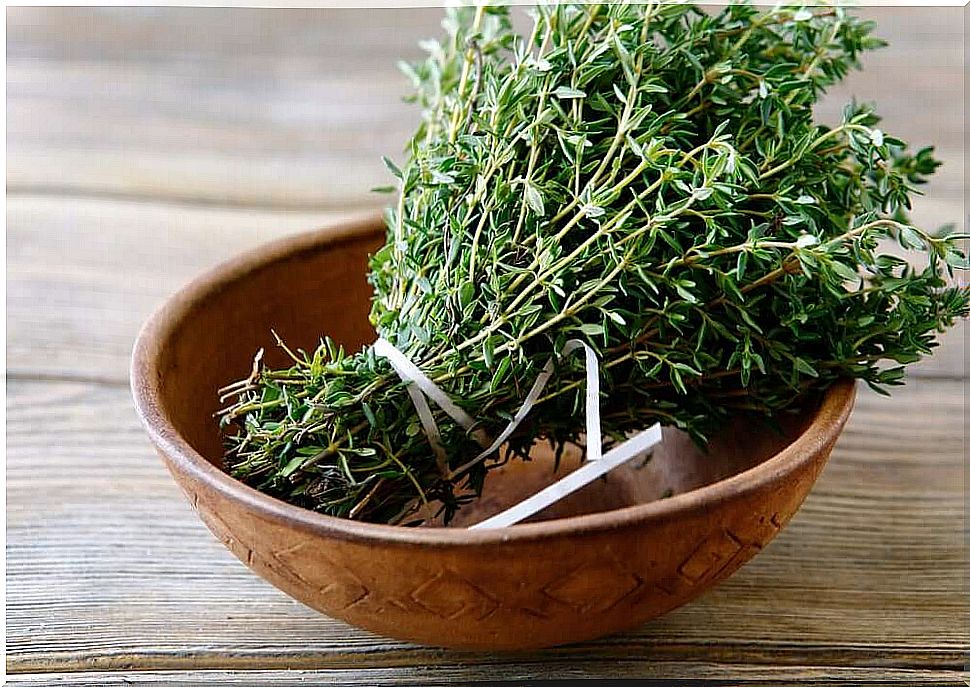
Ingredients
- 1 tablespoon of thyme leaves (10 grams).
- 1 cup of water (250 ml).
Preparation
- First, heat the water and, when it boils, add the thyme.
- Then cook for 15 minutes and remove from heat.
- Let stand until it equilibrates to room temperature.
- Then strain and place in a spray bottle.
- Finally, apply to the affected area to disinfect and clean.
If you want to take advantage of the properties of this infusion, for example, if you are coughing or have a cold, you can add a few more ingredients.
Ingredients
- Thyme leaves (10 grams).
- 1 cup of water.
- Honey (30 ml).
- ½ lemon.
Preparation
- Put the water on the fire and heat it.
- When it starts to boil, add the thyme and cook for 15 minutes.
- Remove and let stand for 10 minutes.
- Strain and add the tablespoon of honey.
- Squeeze the lemon and add the juice to the infusion.
- Drink it as hot as possible.
Who Should Avoid Thyme Infusion?
- People suffering from stomach ulcers.
- People suffering from chronic heart problems.
- Pregnant.
Be sure to consume this infusion sparingly, avoiding more than one cup a day, as too much can be counterproductive. Furthermore,

